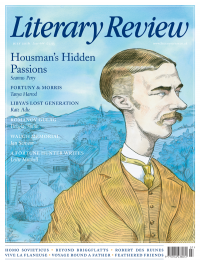Patrick Scrivenor
Turf Wars
Mr Darley’s Arabian: High Life, Low Life, Sporting Life – A History of Racing in Twenty-Five Horses
By Christopher McGrath
John Murray 426pp £25
There are few sights uglier than the finish of a horse race. Atop each elegant, patient beast, straining to do its best and bearing 85 per cent of the risk, perches a diminutive specimen of the hairless ape, crouched in a foetal posture, flailing away with a whip and, if successful, yelling in triumph at a victory that he is only partly entitled to claim.
The jockey may be the salt of the earth; the horse might be an intractable brute that kicks the stable boys and bites its trainer; the use of the whip is – supposedly – regulated. Nevertheless, this stereotypical image is disquieting. It is the misfortune of the horse that it can run fast – something that excites mankind’s basest passions. Christopher McGrath’s book amply testifies to the fact that the history of horse racing is one of fraud, villainy and considerable cruelty. Because horses are beautiful and because their speed is sensational, they shed glamour over the human shenanigans clustered round the business of racing. There is nothing ‘glamorous’ about ‘the turf’. From the dodges of trainers and owners down to the financial dealings of the betting industry, horse racing is remorselessly seedy.
The unlikely outcome of it all is something close to perfection: the thoroughbred horse. McGrath starts his history with an Arabian stallion imported by Thomas Darley in 1704. Tracing the line through a further twenty-five stallions, he reaches Frankel in the 21st century, perhaps the finest racehorse ever to have

Sign Up to our newsletter
Receive free articles, highlights from the archive, news, details of prizes, and much more.@Lit_Review
Follow Literary Review on Twitter
Twitter Feed
Under its longest-serving editor, Graydon Carter, Vanity Fair was that rare thing – a New York society magazine that published serious journalism.
@PeterPeteryork looks at what Carter got right.
Peter York - Deluxe Editions
Peter York: Deluxe Editions - When the Going Was Good: An Editor’s Adventures During the Last Golden Age of Magazines by Graydon Carter
literaryreview.co.uk
Henry James returned to America in 1904 with three objectives: to see his brother William, to deliver a series of lectures on Balzac, and to gather material for a pair of books about modern America.
Peter Rose follows James out west.
Peter Rose - The Restless Analyst
Peter Rose: The Restless Analyst - Henry James Comes Home: Rediscovering America in the Gilded Age by Peter Brooks...
literaryreview.co.uk
Vladimir Putin served his apprenticeship in the KGB toward the end of the Cold War, a period during which Western societies were infiltrated by so-called 'illegals'.
Piers Brendon examines how the culture of Soviet spycraft shaped his thinking.
Piers Brendon - Tinker, Tailor, Sleeper, Troll
Piers Brendon: Tinker, Tailor, Sleeper, Troll - The Illegals: Russia’s Most Audacious Spies and the Plot to Infiltrate the West by Shaun Walker
literaryreview.co.uk